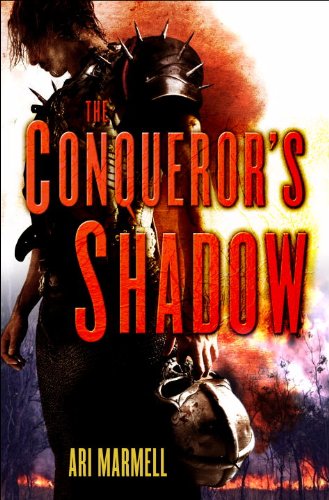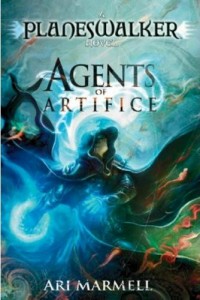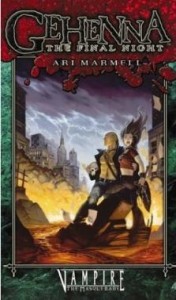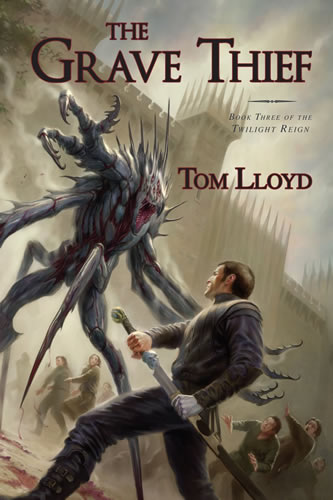 Ari Marmell’s been around the writing scene for years, but his name only hit my ears with the release of The Conquerer’s Shadow, his first work outside the world of Pen & Paper RPGS and tie-in Novels.
Ari Marmell’s been around the writing scene for years, but his name only hit my ears with the release of The Conquerer’s Shadow, his first work outside the world of Pen & Paper RPGS and tie-in Novels.
The Conquerer’s Shadow is a twist on the genre, throwing the reader into the story alongside a former ‘evil lord’-type and challenging them to re-consider what it means to be a protagonist… and a hero.
Intrigued by Marmell’s take on the genre, as well as his experience with the under-explored world of tie-in fiction, I gathered him up and ran him through my gauntlet of questions. Did he survive? Read on and find out.
The Interview
Ari! Welcome to A Dribble of Ink! Anything you’d like to say to set the tone?
To set the tone? F-sharp major.
Or possibly just thanks for having me here.
Okay, I gotta get this one out of the way early. Blake Charlton can be found at blakecharlton.com. Neil Gaiman can be found at neilgaiman.com. Paul Kearney, predictably, can be found at paulkearney.com. Starting to see a trend? Ari Marmell can be found at… wait, mouseferatu.com?
What’s the deal with Mouseferatu?
Way back in ’99 or thereabouts, I was looking for a handle to use on the White Wolf forums. I came up with “Mouseferatu, Rodent of the Dark” pretty much on a lark. But that’s how I became known on the forums, so when I started freelancing for White Wolf, it just sort of stuck. Once I’d had the name on various forums and the e-mail, I just figured I’d run with it, make it sort of a “brand.” (The awesome logo that my friend Chung-Mau Cheng designed certainly helped, too.)
But if people find it less confusing, you can also get to the site by typing in www.arimarmell.com. I’m easy.
Speaking of the online world, social networking sites like Facebook, Twitter and the blogosphere have changed the way fans interact with their favourite authors, blurring that mystical line that used to separate the two except at conventions and readings.
What sort of effect has this had on your writing career? Does it make the job easier or more difficult?
Hmm. Some of each, if I may be allowed a wishy-washy answer.
I enjoy interacting with fans. It adds a level of immediacy to the process, it can be a lot of fun, and it reminds me constantly that, hey, there are actual people who are part of this great amorphous mass that we call “the market.” It’s a reminder of one of the main reasons I do this (the other reason being that I love doing it, and pretty much suck at everything else). And it helps me improve; when it’s offered thoughtfully, I really do try to pay attention to criticism, and if I find it contains valid points, to learn from it.
But it can also be distracting. It’s very easy for a writer—especially a neurotic one, like me—to get so wrapped up in the social networking that it takes time from the actual, y’know, writing. And it’s very easy for us to forget that the people online still represent only a portion of the audience; we can easily get a swelled head from the kudos, or be seriously discouraged by the complaints.
Given the choice between having it or not having it, I’m really glad it’s there. But like everything else, it requires a strong sense of moderation (something I’m still working on).

They called him the Terror of the East. His past shrouded in mystery, his identity hidden beneath a suit of enchanted black armor and a skull-like helm, Corvis Rebaine carved a bloody path through Imphallion, aided by Davro, a savage ogre, and Seilloah, a witch with a taste for human flesh. No shield or weapon could stop his demon-forged axe. And no magic could match the spells of his demon slave, Khanda.Yet just when ultimate victory was in his grasp, Rebaine faltered. His plans of conquest, born from a desire to see Imphallion governed with firmness and honesty, shattered. Amid the chaos of a collapsing army, Rebaine vanished, taking only a single hostage—the young noblewoman Tyannon—to guarantee his escape.
Seventeen years later, Rebaine and Tyannon are married, living in obscurity and raising their children, a daughter and a son. Rebaine has put his past behind him, given up his dreams of conquest. Not even news of Audriss—an upstart warlord following Rebaine’s old path of conquest—can stir the retired warrior to action.
Until his daughter is assaulted by Audriss’s goons.
Now, to rescue the country he once tried to conquer, Rebaine once more dons the armor of the Terror of the East and seeks out his former allies. But Davro has become a peaceful farmer. Seilloah has no wish to leave her haunted forest home. And Khanda . . . well, to describe his feelings for his former master as undying hatred would be an understatement.
But even if Rebaine can convince his onetime comrades to join him, he faces a greater challenge: Does he dare to reawaken the part of him that gloried in cruelty, blood, and destruction? With the safety of his family at stake, can he dare not to?
What many readers might not realize is that the blurbs they find online, or on the back of novels, are generally not the work of the author, but rather someone at their publisher. So, what can you tell us about The Conquerer’s Shadow that isn’t found in the blurb above?
First off, this is not particularly a story of redemption. (I won’t say whether or not it ends up that way—don’t want to spoil anything—but that’s certainly not the point.) Corvis Rebaine isn’t necessarily a “good guy” now, despite being the protagonist, but very much an anti-hero. He’s willing to do some pretty nasty things; he’s just better than the villain, who’s worse.
That said, despite the truly horrible things he’s done, I really tried to write Corvis as a sympathetic character. My intent, and my hope, is that even when the reader despises some of what Corvis did—and does—they’ll understand why he does them.
There are also some very funny aspects to the book. One of my favorite things, as both writer and reader, is the juxtaposition of humor and horror together—sometimes even in the same scene.
From the sounds of it, subverting the traditional tropes of the genre is a key factor in The Conquerer’s Shadow. Was this a natural story to tell? Or is it the result of a conscious response to your observations of the genre?
Some of each, honestly. I’m certainly very aware of fantasy’s basic tropes, since I grew up on Dungeons & Dragons, and on writers like Feist and Eddings. (Also Brust, but he’s less traditional.) I’m a big fan of those tropes and traditions—but more specifically, in either tweaking those tropes, or starting with them and then moving off the expected course. It just comes naturally to me, and a lot of my fiction goes that route to some extent or another.
That said, with The Conqueror’s Shadow, there was deliberate effort as well. When the idea first occurred to me, it was very literally just “Hey, wouldn’t it be cool to write a story where a traditional ‘evil warlord’ had to come out of retirement to deal with someone worse?” So when I first began building Corvis Rebaine, and the plot, I made a concerted effort to include lots of the traditional “evil tropes”—the skull helm, the monstrous allies, the demonic minion—precisely so I could then turn around and come at them from the other direction.
It’s said by some that writers should write what they know. Blake Charlton claims that you should write about what you fear. This being said, what does Corvis Rebaine tell us about the real Ari Marmell?
I’d disagree with both, and say you should write about what interests you, since if a writer’s not enthusiastic about his work, the readers may well not be either.
But that said, what does Corvis tell you about me? Hmm. Corvis is a combination of wish-fulfillment and warning. There are times when I wish that someone with the power and the will really would come along and try to force the world to make sense, to accept some measure of justice, to hold leaders accountable. But I also know that anyone with that sort of power must inevitably turn out to be flawed and quite possibly as bad as what he’s trying to replace—and in any event, would have to commit such horrors in the process as to mitigate any positive results.
So I guess there is, indeed, an element of what I fear in Corvis—even if there’s also an element that the angrier parts of me might occasionally long for.
So writing is a way for the meek, antisocial writer-type to unleash the emotions roiling in the deepest pit of their soul?
Uh… I don’t know if I’d quite put myself into either the “meek” or “antisocial” categories. (And if someone else puts me in them, I’ll quietly sulk away to sit by myself. Oh, crap, wait a minute…) But yes, writing certainly can be a way to formulate or express thoughts and opinions that the writer might otherwise not express.
On the other hand, it’s dangerous to assume that all writers do that, or that any writer does it all the time. There are plenty of things in my books that I absolutely don’t agree with, and plenty more than have no deeper meaning (at least in my own thoughts/psyche) one way or the other.
The Conquerer’s Shadow is your first step outside the deepest, dirtiest gutter of Fantasy: shared-world and tie-in fiction. There’s a common misconception that tie-in fiction is to Fantasy as Penthouse is to Playboy: enjoyable, dirty and rough, but ultimately unsophisticated. This perception is beginning to shift, with names like Tobias Buckell, Greg Bear and David B. Coe stepping into the game. Dan Abnett, who works in the Warhammer 40k universe, writes some of the finest military fiction on shelves today. Hell, even Robert Holdstock, author of the classic Mythago Wood, has written tie-in.
How working in shared worlds has help craft you as a writer? Was The Conquerer’s Shadow ultimately a better book because of your experience with tie-in fiction?
 I think working in shared-world properties is a valuable experience for any writer, and yes, it definitely helped me. I learned to stretch certain creative muscles I otherwise might not have—specifically, the ability to still be creative when working within someone else’s parameters. If I can learn to write a pre-existing character from Vampire: the Masquerade or Magic: the Gathering that I didn’t create, but still get their “voice” right, then I’m that much more likely to be able to remain in a consistent voice even for characters of my own creation. Similarly, writing in shared worlds teaches how to focus on specific aspects of plot and setting. If, for example, I’m not allowed to change certain details, it means that my story needs to zero in much more intently on those that I can.
I think working in shared-world properties is a valuable experience for any writer, and yes, it definitely helped me. I learned to stretch certain creative muscles I otherwise might not have—specifically, the ability to still be creative when working within someone else’s parameters. If I can learn to write a pre-existing character from Vampire: the Masquerade or Magic: the Gathering that I didn’t create, but still get their “voice” right, then I’m that much more likely to be able to remain in a consistent voice even for characters of my own creation. Similarly, writing in shared worlds teaches how to focus on specific aspects of plot and setting. If, for example, I’m not allowed to change certain details, it means that my story needs to zero in much more intently on those that I can.
Plus, of course, when you’re dealing with an editor and/or creative team who are saying “You must do X,” you learn very quickly how to work with other people. It’s not always fun, but it’s something you’ve got to know how to do.
As far as The Conqueror’s Shadow, it absolutely helped. Granted, the very first draft of the book was written before any of my tie-in materials, but it’s changed dramatically since then. Partly due to my experience on my Magic novel, Agents of Artifice, I was able to seriously tighten this one up and give a more coherent look into the world in which the story is taking place.
And of course, by studying what you’re asked to do in a tie-in novel, an author can start to get a sense of where the market is at the moment. Obviously, any given tie-in property doesn’t represent the market as a whole, but if it’s at all successful, it obviously appeals to at least a significant niche. Figuring out why that is—what it is about a given setting or character that the IP owner wants to focus on—is a good data point to any growing understanding of the market as a whole.
Would you say it’s as hard to break into the tie-in fiction market as it is to publish an original novel? What is the process for getting involved in tie-in fiction like?
I think it’s probably no easier and no harder, just very different. I don’t think there’s any specific process; I can only talk about how I did it myself. In my case, it came about as a result of my RPG writing. The people at White Wolf liked my work on the Vampire: the Masquerade line enough that, when it came time to end that line, they offered me the final novel, Gehenna: the Final Night. I realize that sounds like it just fell in my lap, but I’d spent the prior four years doing freelance writing for them, so I’d definitely paid my dues.
 It happened similarly with WotC. It was a combination of the freelance work I’d done for them, and a copy of Gehenna, which I’d sent them, that convinced them to give me a shot on the new Ravenloft line. (That resulted in Black Crusade, which is a novel that’s only available online, because the new Ravenloft line was canceled by management before the book could be published.) And that, in turn, is what convinced them to give me a crack at the book that became Agents of Artifice.
It happened similarly with WotC. It was a combination of the freelance work I’d done for them, and a copy of Gehenna, which I’d sent them, that convinced them to give me a shot on the new Ravenloft line. (That resulted in Black Crusade, which is a novel that’s only available online, because the new Ravenloft line was canceled by management before the book could be published.) And that, in turn, is what convinced them to give me a crack at the book that became Agents of Artifice.
I think the bottom line is that you can’t usually just come up out of nowhere and expect to be given the opportunity to write a tie-in novel. (There are a few tie-in properties that accept unsolicited submissions to their “slush pile,” and a few success stories have come out of those. But as I understand it, those represent a minority of properties.) Usually you have to prove yourself with other sorts of writing—be it original novels, short stories, RPG writing, or other sorts of freelancing—before an IP owner is going to give you the keys to their property.
Interesting. That’s one side of the industry that is often left in the dark, which, I believe, is part of the reason that tie-in authors don’t get the level of respect that they may deserve (well… the good ones, at least).
Going in another direction, in this interview with Matt Staggs, you mention David Eddings and his The Elenium series as a decent extension for those who enjoy The Conquerer’s Shadow. From my experience with Eddings, his stories are very much about good versus evil, a theme you heavily subvert in The Conquerer’s Shadow.
I’m curious where the similarities lie between The Conquer’s Shadow and Eddings work (along with other works of ’80’s Fantasy, an era which seems to be a strong influence on your work.
Well, I don’t plot the way Eddings did. His stories tended to be fairly straightforward, whereas I prefer more intricate plots; not necessarily convoluted, but not quite straight lines.
It’s true that Eddings definitely didn’t go for the antihero—but he does have characters who are often of the “I’ll do minor evil if it accomplishes major good” variety. So in that sense, I guess there’s a continuum of characters that I just took a lot farther than he did.
Eddings was, if I remember correctly, my first introduction to the concept of a truly older hero. The knight Sparhawk is not a young man, and I think a lot of that image stuck with me, and came back up when I developed Corvis.
And while Eddings overdid it at times, his characters have a certain sort of sarcastic sense of humor that really resonates with me, and that can be seen in a lot of my work, including The Conqueror’s Shadow.
(At this point, I should offer a confession. I probably overdid it myself in The Conqueror’s Shadow, if only just a bit. As I said, I really like that sort of sarcasm, but several people have pointed out that I probably gave it to too many different characters. I’ve tried to rein it in a little in The Warlord’s Legacy and other, more recent books. My main characters will almost always be smart-asses—that’s just who I am, as a writer—but not all the secondary characters need to be. See, guys? That’s the sort of feedback I wouldn’t have gotten, and a lesson I wouldn’t have learned, in the days before all the online interaction.)
In a more general sense, the fantasy of the 80s is where many of the common tropes of fantasy were established, and while some people are tired of them, I still enjoy playing with those tropes. Now, I prefer to twist them—as you say, subvert them—or at least to examine them from a different angle. You wouldn’t want a book of just tropes, offered plainly, after all; but they’re still present, for all that.
Back to Eddings, I think he was, for lack of a better way to put it, very aware of the genre. He knew the tropes and standards of the field, and he used them in very deliberate ways. While I choose to use them in very different ways than he did, I think that general awareness of them is something I picked up, in part, from him.
In terms of 80’s-style-fantasy, authors such as Ken Scholes, Blake Charlton and Brandon Sanderson have been doing their damnedest to keep it going strong. In your opinion, which of the young writers working in the sub-genre are most worth keeping an eye on?
You know, I’ll be honest; I haven’t found a lot of newer writers who I feel are keeping the 80’s-style-fantasy going. That doesn’t mean they don’t exist (and I’m actually going to check out some of the ones you just named), just that I haven’t stumbled across them. But to be fair, I’m very picky about how I choose books from authors I’m not already familiar with. For instance, if a book is the start of a series—and if that series is a single long story (like The Belgariad, for instance, as opposed to a line of semi-standalone books like The Dresden Files)—I often won’t pick it up until the entire series is already out and on shelves.
 That said, I’ve enjoyed what I’ve read of Tom Lloyd; he has a lot of the “old-fashioned epic” feel going, while adding some more “modern” touches in terms of storytelling technique. I’ve heard great things about James Enge’s sword-and-sorcery, though I haven’t had the chance to read any of them yet.
That said, I’ve enjoyed what I’ve read of Tom Lloyd; he has a lot of the “old-fashioned epic” feel going, while adding some more “modern” touches in terms of storytelling technique. I’ve heard great things about James Enge’s sword-and-sorcery, though I haven’t had the chance to read any of them yet.
Well, to broaden the question, every reader’s got those authors who they love, but no one else ever seems to be aware of them. Who’re some authors you feel deserve more exposure?
Well, in addition to the guys mentioned above, I’d love to see Chris Roberson and Jim Hines get more attention. (They both have a solid fanbase, but I’d like to see them get bigger.) I’ve really enjoyed the first of Laura Resnick’s “Esther Diamond” series. Not sure if Paul Kidd’s still writing, but I’d love to see more from him—and more attention paid to him. I’ll admit I haven’t had the chance to read his stuff yet—it’s in my “to read” pile—but from everything I’ve heard Matthew Sturges deserves a pretty sizable following.
And uh, well, me, of course. Duh.
Okay, seriously, I’m actually struggling to think of others, just because a lot of the books I’ve read lately are by writers who are already very well established. (When I’m working on my own novels, I tend to read books I already know, rather than new material—and these days, I’m working on my own novels more often than not). I’m also quite sure that as soon as this interview goes live, I’ll think of half a dozen examples I meant to mention.
Though there’s a sequel slated for 2011, The Conquerer’s Shadow more or less stands on its own. Did you have to make any sacrifices to ensure the story didn’t grow beyond the bounds of a single volume?
I didn’t, actually. In fact, when I first wrote The Conqueror’s Shadow, I’d never intended to write a sequel, so the book really was designed from the get-go to stand alone. The idea for the sequel—or possibly even sequels, if the opportunity and the interest are there—came later.
What can you tell us about the sequel,The Warlord’s Legacy? Does it stand alone as well, or will is it necessary to have read The Conqueror’s Shadow?
It’s certainly stronger if you’ve read the first one, since it builds on characters and events introduced therein. But I don’t think it’s necessary. I really did my best to make sure that everything the reader must know is explained in the book. So while certain details, revelations, and plot points won’t have the same emotional resonance if you haven’t read The Conqueror’s Shadow, The Warlord’s Legacy should still be a perfectly good/enjoyable fantasy novel.
As for what I can tell you about it… Hmm. I obviously don’t want to spoil anything, or go into too much detail before the publisher’s ready. So let me say this: It takes place several years after the end of the first book, and it showcases the consequences—mostly negative—of Corvis’s past actions, not only during his days as the Terror of the East, but over the course (and at the end) of The Conqueror’s Shadow as well.
You mention that the concept for follow-ups to The Conquerer’s Shadow came up later. Not surprisingly, then, you’ve got a couple of other projects slated for release that have nothing to do with The Conquerer’s Shadow. Can you tell us more about The Goblin Corps and Household Gods, the first Young Adult acquisition by Pyr Books?
The Goblin Corps is even more of a “flipping” of traditional fantasy tropes than my other books. This book is about a squad of goblins–an orc, a troll, etc.–in the service of an undead tyrant called the Charnel King. It’s kind of a look at what the villains are doing while the heroes are running around in a story that they (mistakenly) believe is a very traditional, Tolkien-esque epic fantasy.
And make no mistake, this is a book about the villains. Corvis Rebaine, of The Conquerer’s Shadow, is anti-hero, but these, despite being the protagonists, are straight-up bad guys, and unapologetic about it. The book’s funny enough that you sometimes forget how nasty these characters are–until they do something to remind you. (Some readers will be bothered by that, and that’s understandable, but I think most will find it a blast to read.) The novel is sarcastic, brutally gory, and foul-mouthed enough to make Eddie Murphy or Quentin Tarantino cringe.
Household Gods, on the other hand, is about a character who’s actually mostly a good guy. (Yes, I can write those; try not to act too shocked.) Granted, she’s a thief, but she’s basically a good person. She also has a god, that nobody else in the world worships, watching over her shoulder and kind of living in her head.
The book’s set in a Renaissance-style city, rather than the more traditional medieval setting of most fantasies. It’s not nearly as dark as the others, or as wide-ranging; it’s very much an urban romp of an adventure (though it does have its dark elements; this is still me, after all). Actually, the funny thing is, I didn’t deliberately set out to write a YA-novel; I just produced a novel that, my agent and I realized after the fact, was a perfect fit for YA.
Ahh, I’m always a sucker for Renaissance-era Fantasy, though there’s not much of it.
You make an interesting distinction between ‘hero’ and protagonist. Can you think of any novels that play with the idea of casting a truly villainous character as the protagonist or narrator?
It’s a more common tropes in horror than in sci-fi or fantasy, and a huge number of vampire novels (such as Anne Rice’s) do so, of course. In terms of fantasy… Some years back, Eve Forward published Villains by Necessity, which centered on a band of villains. But I felt that, by the end, most of the “villains” (but one or two) had actually revealed themselves to be really not all that bad, so I’m not sure the book fully qualifies. I think one could argue that Elric is, depending on which particular book you’re talking about, at least borderline villainous. I personally found Thomas Covenant utterly despicable, enough that I couldn’t finish the book—and given the sorts of characters I often write, that’s saying something. And there’s a surprising amount of villain-oriented tie-in novels, from Ravenloft to a few scattered Forgotten Realms novels to Star Wars novels focused on Sith or Imperial characters.
What’s more common are amoral characters, rather than immoral/truly villainous ones. And you’ll often find characters who are evil in some respects—Vlad Taltos is an assassin and crime lord, during some of his earlier novels, and the members of the Black Company certainly aren’t exactly good guys—but neither are such examples bad enough to be called “villains.”

I’m with you on the Thomas Covenant angle. I finished the first book, as a favour to my Mom and a friend, who love the books, but that was the end of my relationship with Donaldson’s novels.
On a brighter note, Ari, it was a pleasure! Any final words?
Well, assuming you want something a little more meaningful than “Everybody please buy my stuff!”…
Seriously, thanks. Thank you for the opportunity, and thanks to everyone who was interested enough to read what I had to say.

Great interview, Aidan and Ari! I especially loved the shout-out to 80s fantasy. And in honor of that, I’ll read Conqueror’s Shadow right after I finish Dragonfly Falling :)
Really sharp and insightful interview, Aidan. Nicely done.
Found that really interesting – thanks to you both.
[…] Dribble of Ink interviews Ari Marmell, author of Conquerer’s […]
[…] Dribble of Ink interviews Ari Marmell, author of Conquerer’s […]